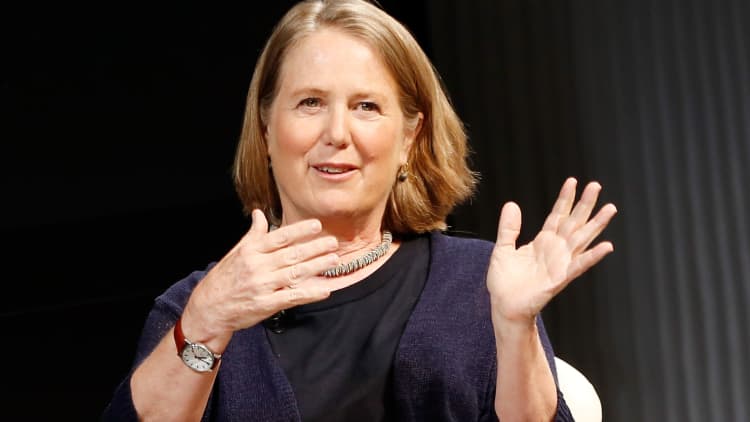Diane Greene, who was hired three years ago to build Google's cloud-computing business, is being replaced in that job by former Oracle executive Thomas Kurian.
Google said on Friday that Kurian is joining Google Cloud on Nov. 26 and will take over the leadership role in early 2019. Greene will remain CEO of the business until then.

It's been a rocky tenure for Greene, who brought serious enterprise chops to Google, having previously co-founded and run VMware. She's staffed up the enterprise sales team and won business from the likes of Spotify and Snap, but Google has failed to eat into Amazon's massive lead in the market, and Microsoft has clearly established itself in second place.
Greene, a director of Google parent company Alphabet since 2012, is staying on the board.
Kurian spent more than two decades at Oracle, rising to the level of president of product development. In September he said he was taking "extended time off" in an email to employees, but he resigned before the end of the month.
Greene wrote in a blog post on Friday that she, Google CEO Sundar Pichai and Urs Hölzle, Google's senior vice president for technical infrastructure, all interviewed Kurian for the job. Hölzle originally recruited Greene to the job, which she accepted when Google acquired her previous start-up Bebop for $380 million in stock. Greene's share of that was almost $150 million, which she said at the time she would donate to a donor-advised fund.
"When I joined Google full-time to run Cloud in December 2015, I told my family and friends that it would be for two years," Greene wrote. "Now, after an unbelievably stimulating and productive three years, it's time to turn to the passions I've long had around mentoring and education."
Amazon Web Services controls 34 percent of the cloud infrastructure services market, according to Synergy Research. Microsoft is second at about 15 percent, followed by IBM in third and Google in fourth, both with market share in the single digits.
Alphabet raised eyebrows in its earnings call last month, when the company gave less information than it had in the past on the size and growth rate of the cloud unit.
In February, Pichai told analysts that the total cloud business, which includes applications for email, word processing and spreadsheets as well as public cloud infrastructure, was generating more than $1 billion in revenue per quarter. He said that, based on publicly available data from 2017, it was likely growing faster than any of its rivals.
But when asked for an update in October, Pichai neglected to offer specifics, saying only that he's seeing "strong indicators" that the investment is paying off and that enterprise wins "turn into larger revenue deals over time."
Some analysts were unimpressed.
"There were notably no metrics in relation to the cloud business, which we view as not an overly encouraging sign," analysts from Atlantic Equities wrote in a report after Alphabet's earnings report.
Under Greene's leadership, the Google Cloud Platform focused engineering resources on artificial intelligence and machine learning to give other companies the types of tools that had been powering Google's search and other services since its early days. Clients often touted the company's advanced technologies for running sophisticated workloads, but the bigger sums of money for core infrastructure were still going to AWS and Microsoft Azure.
"They're not winning the boring lift-and-shift business — that goes directly to Amazon," said Maribel Lopez, an industry researcher at Lopez Research in San Francisco. "They have really good positioning around the innovative stuff, but the things they're not getting are the more basic things."
Facing Google's culture
Earlier this year, Greene faced an internal and external outcry over a controversial Department of Defense contract — dubbed Project Maven — to analyze and interpret drone videos via AI technology. Word of the deal led several thousand employees to sign a petition urging Pichai to keep Google out of the "business of war," while dozens resigned in protest.
In taking over for Greene, Kurian faces a significant cultural challenge that's been a consistent source of tension at Google. It's a consumer-focused, engineering-driven company with some of the highest profits margins in technology that's never been able to fully embrace the realities of selling to the enterprise.
No company is more closely associated with the enterprise than Oracle, but getting thousands of engineers and sales people on board is a tall task. A year ago, Greene announced that Diane Bryant, formerly the head of Intel's data center business and a potential CEO candidate at the chipmaker, was joining Google Cloud as its operating chief. Seven months later she was gone.
Here's Greene's full blog post:
Transitioning Google Cloud after three great years
Hello All,
When I joined Google full-time to run Cloud in December 2015, I told my family and friends that it would be for two years. Now, after an unbelievably stimulating and productive three years, it's time to turn to the passions I've long had around mentoring and education.
The mentoring will include investing in and helping female founder CEOs who have engineering or science backgrounds. I want to encourage every woman engineer and scientist to think in terms of building their own company someday. The world will be a better place with more female founder CEOs.
The work in education will especially be initiatives that combine technology with in-person teaching to make high-quality education that is low-cost, scalable and personalized. When bebop was purchased by Google, I committed all of my proceeds to philanthropy, it is high time to put that money to work!
Thomas Kurian, a respected technologist and executive, will be joining Google Cloud on November 26th and transitioning into the Google Cloud leadership role in early 2019. Sundar, Urs and I all interviewed Thomas, and I believe that he'll do an amazing job helping to take Google Cloud to the next level.Thomas has 22 years of experience at Oracle; most recently he was President of Product Development.
I will continue as CEO through January, working with Thomas to ensure a smooth transition. I will remain a Director on the Alphabet board.
The Google Cloud team has accomplished amazing things over the last three years, and I'm proud to have been a part of this transformative work. We have moved Google Cloud from having only two significant customers and a collection of startups to having major Fortune 1000 enterprises betting their future on Google Cloud, something we should accept as a great compliment as well as a huge responsibility.
We've built a strong business together—set up by integrating sales, marketing, Google Cloud Platform (GCP), and Google Apps/G Suite into what is now called Google Cloud.
We established a training and professional services organization and partnering organizations. We revamped customer engineering and added a team of experts in the Office of the CTO. We also pioneered a way to help enterprises adopt AI through our Advanced Solutions Lab. We built out a full marketing organization that in just three years has received many recognitions including Cannes Lions awards. We set up our industry verticals org where we have achieved massive traction in health, financial services, retail, gaming and media, energy and manufacturing, and transportation. We set up the Cloud ML and the Cloud IoT groups. We acquired Apigee, Kaggle, qwiklabs and several great small startups. Our technology development has been recognized throughout the industry, and Google Cloud is differentiated in security, AI, open hybrid application modernization, G Suite, and many other areas. We are now recognized as a leader in 11 Gartner Magic Quadrants and Forrester Waves.
But here's what I'm most proud of: the phenomenal team assembled and how we together have built out all of our functions for customer-facing enterprise readiness and engineering enterprise execution. When this journey started, some people would say that Google had great technology but they weren't sure that customers would rely on Google as their enterprise partner. At our recent Google Cloud Next event in San Francisco, we had over 23,000 attendees, representing 10x growth from 2016. With nearly 300 customers speaking about how Google Cloud is helping to transform their businesses, no one was questioning our seriousness or our abilities.
The cloud space is early and there is an enormous opportunity ahead. I have loved working with everyone. I am especially grateful to all of our customers, partners, and employees for an amazing three years of getting to work with you.
—Diane
WATCH: Greene says Google's cloud is growing faster than any other




